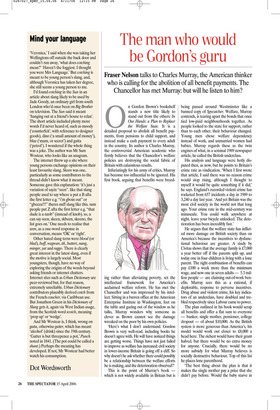Mind your language
‘Veronica,’ I said when she was taking her Wellingtons off outside the back door and couldn’t run away, ‘what does cotching mean?’ ‘Haven’t the foggiest. I thought you were Mrs Language.’ But cotching is meant to be young person’s slang, and, although Veronica has taken her degree, she still seems a young person to me.
I’d found cotching in the Sun in an article about slang likely to be used by Jade Goody, an ordinary girl from south London who’d once been on Big Brother on television. The Sun said it meant ‘hanging out at a friend’s house to relax’. The short article included plenty more words I’d never heard of, such as moody (‘counterfeit’, with reference to designer goods), dino (‘a small amount of money’), blue (‘mum, or secret’) and gatta (‘petrol’). I wondered if the whole thing was a joke. The author was Mr Sam Wostear, who looks like an anagram.
The internet threw up a site where young persons exchange opinions on their least favourite slang. Skeen was one, particularly as some contributors to the thread didn’t know what it meant. Someone gave this explanation: ‘it’s just a variation of sayin “seen”. like that slang people used to say where u put a B afta the first letter e.g. “i’m gboin out” or “gbeeza!!!” theres nuff slang like this. sum people put Z afta the first letter e.g. “that dude is a nzob” (instead of knob). so, u can say seen, skeen, skbeen, skeeno, the list goes on.’ One needs to realise that seen, as a one-word response in conversation, means ‘OK’ or ‘right’.
Other hated slang terns were blood (or blad), buff, wagwan, tik, butterz, nang, minger, yat and raggo. There is clearly great interest in the latest slang, even if the motive is largely social. Most youngsters, though, have no way of exploring the origins of the words beyond asking friends or internet chatters. Internet sites such as Urban Dictionary are peer-reviewed but, for that reason, extremely unreliable. Urban Dictionary contributors plausibly derived cotch from the French coucher, via Caribbean use. But Jonathon Green in his Dictionary of Slang gets it, again via West Indian usage, from the Scottish word scotch, meaning ‘prop up’ or ‘wedge’.
And Mr Wostear is, I think, wrong on gatta, otherwise gatter, which has meant ‘alcohol’ (drink) since the 19th century. ‘Gatter is but threepence a pot,’ Punch noted in 1841. (The pot could be called a shant.) Perhaps the meaning has developed. If not, Mr Wostear had better watch his consumption.















































 Previous page
Previous page